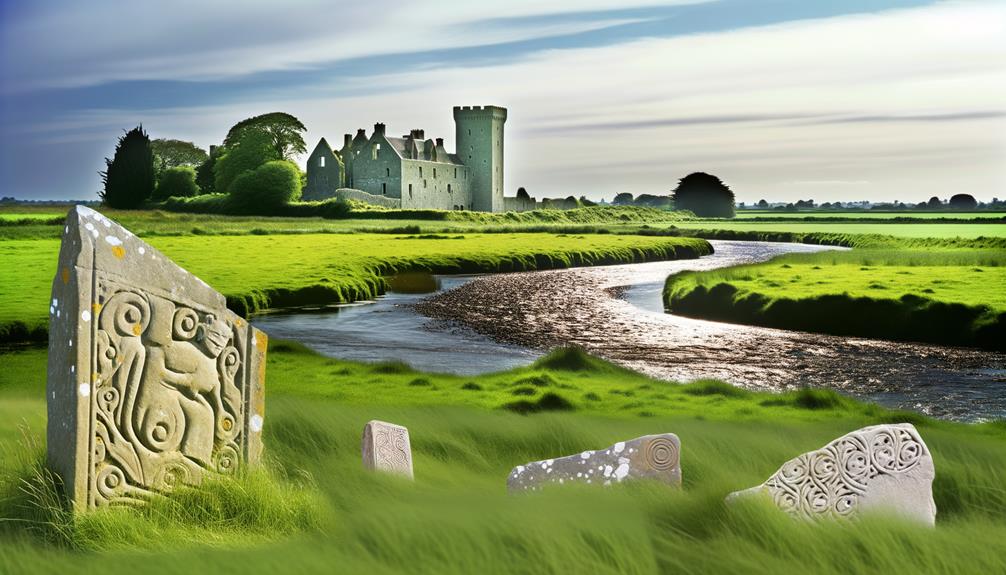Origin and Meaning of the Name Ryan
The name Ryan originates from the Old Irish personal name 'Rían,' derived from Gaelic elements 'rí' meaning 'king' and 'án' implying 'little' or 'descendant.' Historically signifying 'little king' or 'illustrious one,' it embodies leadership, prominence, and valor. Emerging from the surname 'Ó Riain,' meaning 'descendant of Rían,' Ryan reflects the cultural values and hierarchical structure of medieval Gaelic society.
Its modern popularity spans beyond Irish roots, finding global appeal and gender-neutral usage. The name's evolution from ancient nobility to contemporary prominence richly intertwines history and cultural significance, promising more intriguing insights into its legacy.

Key Takeaways
- The name Ryan originates from the Old Irish personal name 'Rían,' meaning 'little king' or 'illustrious.'
- Derived from Gaelic elements 'rí' (king) and 'án' (little), Ryan implies youthful leadership.
- The name Ryan reflects themes of nobility, leadership, and valor in ancient Gaelic society.
- Ryan gained popularity worldwide through Anglicization and emigration, especially during the Great Famine.
- Today, Ryan is a gender-neutral name known for its historical significance and modern versatility.
Etymology of Ryan
The etymology of the name Ryan traces its origins to the Old Irish personal name 'Rían,' which is believed to derive from the word 'rí,' meaning 'king' or 'little monarch.' This nomenclature is steeped in historical and linguistic significance, reflecting the hierarchical and societal structures of ancient Ireland.
The diminutive form, 'little sovereign,' may imply a figure of lesser status or a youthful ruler, offering insights into the social stratification of the time. The shift from 'Rían' to the modern 'Ryan' encapsulates phonetic evolution driven by linguistic changes over centuries.
Understanding the etymological roots of names like Ryan not only enriches our comprehension of language development but also provides a window into the cultural and historical contexts from which these names emerged.
Irish Roots
From the verdant landscapes of Ireland, the name Ryan originates, deeply embedded in the rich tapestry of Gaelic heritage and tradition.
Derived from the Old Irish surname 'Ó Riain,' Ryan translates to 'descendant of Rían.' The element 'Rían' itself is believed to signify 'little king' or 'illustrious.' This nomenclature reflects the societal structure and cultural values of ancient Ireland, where lineage and nobility were paramount.
The name Ryan, thus, carries connotations of leadership and distinction. Its prevalence in Ireland underscores its cultural significance and enduring legacy.
The phonetic qualities of the name, easy to pronounce yet rich in historical resonance, have contributed to its widespread adoption beyond the Irish shores, embedding it in global nomenclature.
Historical Context
Examining the historical context of the name Ryan reveals its evolution through centuries of socio-political changes, reflecting shifts in cultural paradigms and linguistic adaptations.
Originating from the Irish surname Ó Riain, the name Ryan has traversed various historical landscapes, from medieval Gaelic clans to modern global societies.
During the Norman invasion of Ireland, the Anglicization of Irish names began, reshaping Ó Riain to Ryan. The Great Famine and subsequent emigration waves spread the name worldwide, embedding it within diverse cultural fabrics.
In contemporary times, Ryan has transcended its surname origins, becoming a popular given name. This historical journey underscores the dynamic interplay between language, identity, and migration, illustrating how names adapt and persist through changing eras and environments.
Meaning of Rían
Understanding the historical evolution of the name Ryan sets the stage for a deeper exploration into the meaning of its Gaelic origin, Rían.
In its original Irish form, Rían is derived from the Gaelic elements 'rí' meaning 'king' and 'án' which can be translated as 'little' or 'descendant.' Therefore, Rían is commonly interpreted as 'little king' or 'illustrious.'
This etymological analysis underscores the name's connotations of nobility and prominence. The term 'rí' is pivotal, emphasizing leadership and valor, while 'án' nuances the meaning, potentially denoting lineage or endearment.
This rich linguistic heritage imbues the name with layers of cultural and historical significance, reflective of ancient Gaelic society's values and hierarchies.
Cultural Significance
The cultural significance of the name Ryan extends across various societies, encapsulating themes of leadership, nobility, and enduring influence.
Historically rooted in Irish heritage, the name Ryan, derived from the Gaelic 'Rían,' connotes a 'little king' or 'illustrious one.' This attribution underscores a sense of regality and authority, often associated with leadership and governance.
Additionally, Ryan's adoption in literature and media has further bolstered its cultural resonance, portraying characters marked by strength and moral fortitude. In contemporary settings, the name is frequently bestowed upon individuals expected to embody these venerable qualities.
Therefore, Ryan serves not merely as an identifier but as a symbol of aspirational virtues that transcend geographical and temporal boundaries.
Global Popularity
The global popularity of the name Ryan can be analyzed through its rankings in various countries, where it consistently appears in top name lists, reflecting its widespread appeal.
Moreover, cultural adaptations have led to variations in pronunciation and spelling, illustrating the name's flexibility across different linguistic contexts.
Additionally, gender popularity trends reveal a shift from its traditional male association to increasing usage as a unisex name, highlighting evolving cultural norms.
Worldwide Name Rankings
In examining the global popularity of the name Ryan, it is essential to assess its fluctuating rankings across various countries and cultural contexts. In the United States, Ryan has consistently ranked within the top 50 names for boys since the late 20th century, reflecting its widespread acceptance.
In Ireland, its country of origin, Ryan frequently appears among the top 20 names, indicating its cultural resonance. Meanwhile, in countries such as Canada and Australia, Ryan enjoys similar popularity, often featuring in top 100 lists.
Conversely, in non-English-speaking nations, the name's prevalence varies significantly, often influenced by linguistic compatibility and cultural trends. This variability underscores the dynamic nature of name popularity in a globalized world, shaped by both historical roots and contemporary influences.
Cultural Adaptations
Multiple cultural adaptations have contributed to the name Ryan's global popularity, reflecting a complex interplay of linguistic, historical, and social factors.
Initially of Irish origin, the name Ryan has been embraced across various cultures, each adding unique nuances. In English-speaking countries, its phonetic simplicity and modern appeal have facilitated its widespread adoption.
Historical migrations and cultural exchanges have further disseminated the name, embedding it in diverse linguistic contexts. The influence of media and entertainment, particularly through prominent figures in film, sports, and literature, has also played a critical role in enhancing its global resonance.
Consequently, Ryan's versatility and broad acceptance underscore its dynamic evolution within the intricate tapestry of global naming conventions.
Gender Popularity Trends
Analyzing gender popularity trends reveals that the name Ryan, initially mostly male, has increasingly been adopted for females, demonstrating a significant shift in naming conventions across various cultures.
Historically rooted in Irish tradition, where it primarily served as a male given name, Ryan has transcended its original gender specificity. Statistical analyses indicate a marked rise in its usage for females in English-speaking countries such as the United States, Canada, and the United Kingdom.
This evolution may reflect broader societal changes towards gender neutrality and fluidity. Additionally, the phonetic simplicity and cultural resonance of the name Ryan contribute to its cross-gender appeal.
Gender Neutrality
The name Ryan exemplifies the evolving trend towards gender neutrality in contemporary naming conventions, reflecting broader societal shifts towards inclusivity and equality. Traditionally a masculine name of Irish origin, meaning 'little king,' Ryan has increasingly been adopted for females as well, indicating a significant cultural evolution.
This shift highlights the diminishing rigidity of gender-specific naming practices, which historically reinforced binary gender roles. The adoption of Ryan for all genders underscores a progressive move towards recognizing individual identity beyond traditional gender constraints.
This trend is not isolated but part of a broader societal movement towards gender inclusivity, evident in various spheres including media representation, legal frameworks, and educational policies, further emphasizing the name's modern adaptability and relevance.
Modern-Day Appeal
In contemporary society, the name Ryan enjoys widespread appeal due to its harmonious blend of historical significance and modern versatility. Originating from the Old Irish 'Rían,' meaning 'little king,' Ryan carries a regal connotation that resonates with many. Its phonetic simplicity and cross-cultural accessibility contribute to its enduring popularity.
The name's gender-neutral application enhances its modern-day relevance, aligning with contemporary trends towards inclusivity. Statistically, Ryan consistently ranks high among popular names in English-speaking countries, reflecting its broad acceptance. Celebrities and public figures bearing the name further augment its visibility and desirability.
Therefore, Ryan's sustained appeal can be attributed to its rich historical roots, adaptable usage, and alignment with progressive societal values.
Conclusion
In summation, the name Ryan, rooted in Irish heritage and derived from the Gaelic 'Rían,' signifies 'little king' and carries rich historical and cultural significance. Furthermore, the name Ryan has been popularized in many English-speaking countries, including the United States and Canada. It has become a staple in modern society, representing strength, leadership, and honor. In addition, the brett name meaning has further solidified the name’s association with royalty and nobility, making it a popular choice for parents looking for a strong and meaningful name for their child. The name Ryan has also gained popularity in the entertainment industry, with many notable figures carrying the name. This has further solidified its image as a name associated with success and charisma. Additionally, the meaning of the name ace, synonymous with excellence and exceptional ability, complements the traits often associated with the name Ryan, making it a fitting choice for parents seeking a name with positive connotations.
Its global popularity and gender-neutral appeal underscore its adaptability across diverse societies.
The enduring charm of Ryan, akin to a timeless vinyl record, perpetuates its modern-day relevance.
Such attributes underscore the name's robust presence in both historical contexts and contemporary nomenclature, affirming its perennial appeal within the linguistic tapestry.






